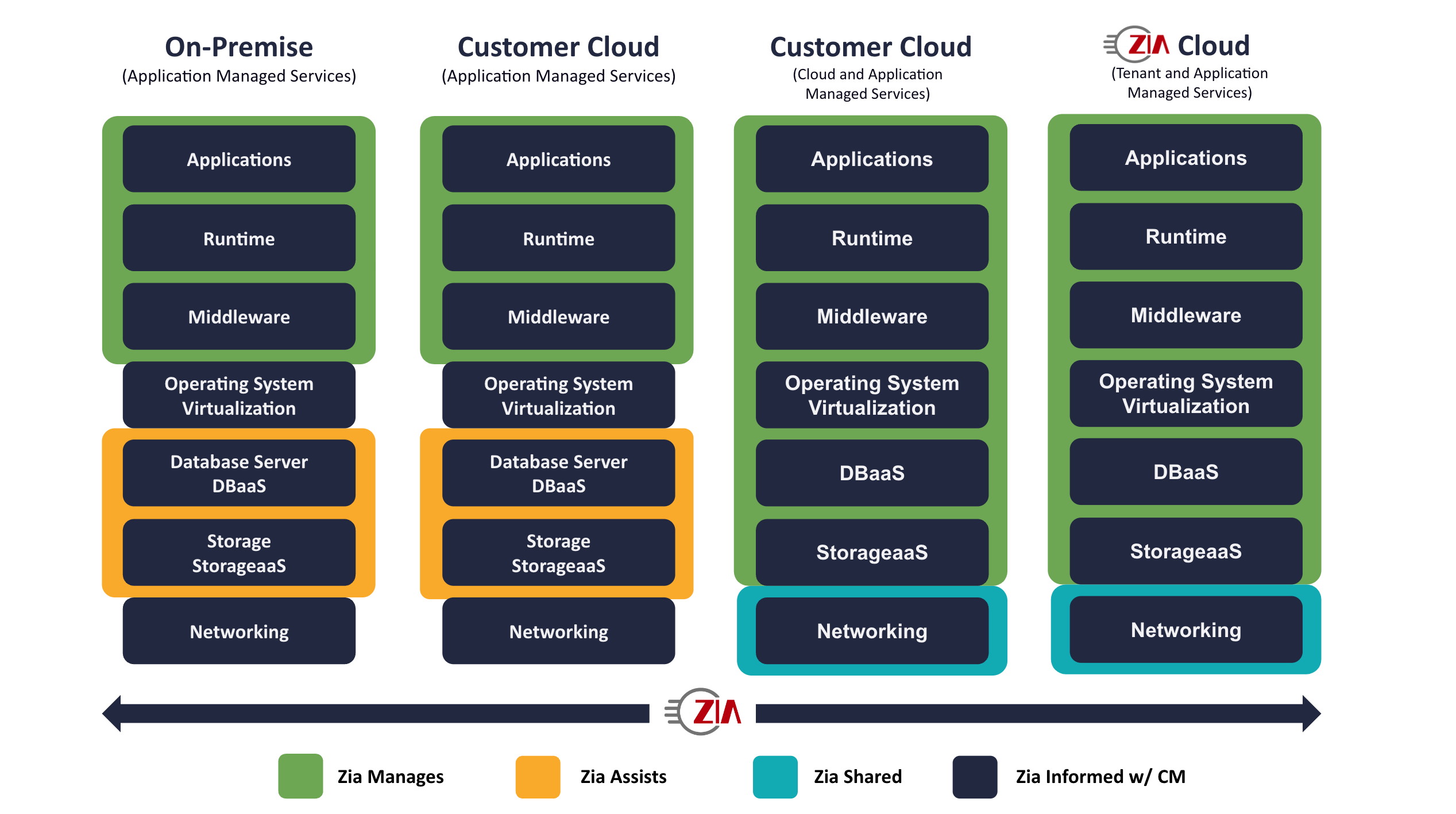Zia deploys managed services on-premise, in the cloud, and in hybrid environments. This provides flexibility to meet your IT infrastructures and business requirements. On-premises managed services provide enhanced security and control by keeping sensitive data and critical applications within your organization’s own on-premise or private cloud infrastructure, which ensures compliance with your governance standards and regulatory requirements.
Cloud managed services offer unparalleled scalability and flexibility, allowing you to quickly adjust your IT resources based on demand without significant upfront investment. It is also cost-efficient and gives you remote accessibility, enabling you to streamline operations and reduce maintenance burdens.
Hybrid managed services combine the strengths of on-premise infrastructure and cloud-based solutions, offering a balanced approach to IT management. This model leverages the benefits of both environments, providing flexibility, efficiency, and enhanced security. The graph below shows our approach to Zia Managed Services options.

Should you choose hybrid managed services, here are some of the key benefits:
1. Scalability and Flexibility
Hybrid managed services provide unparalleled scalability, allowing organizations to scale their IT resources up or down based on demand. This flexibility is crucial for businesses experiencing fluctuating workloads, such as seasonal spikes in e-commerce or project-based increases in computing needs. By combining on-premises infrastructure with cloud resources, businesses can dynamically allocate resources where they are most needed without over-provisioning or under-utilizing their assets.
2. Cost Efficiency
A hybrid approach can be more cost-effective than relying solely on either on-premises or cloud solutions. Organizations can optimize costs by keeping predictable, steady workloads on-premises while leveraging the cloud for variable or high-demand tasks. This reduces the need for significant capital expenditure on hardware and allows businesses to take advantage of the pay-as-you-go model offered by cloud providers. Additionally, hybrid managed services can minimize downtime and improve productivity, further contributing to cost savings.
3. Enhanced Security and Compliance
Security and compliance are critical concerns for many organizations. Hybrid managed services offer enhanced security by allowing sensitive data to be stored on-premises while taking advantage of the cloud for less sensitive workloads. This approach ensures that critical data remains protected under the organization’s control, meeting regulatory and compliance requirements. Additionally, hybrid environments can implement robust security measures, such as advanced encryption, multi-factor authentication, and continuous monitoring, to safeguard data across both platforms.
4. Business Continuity and Disaster Recovery
Hybrid managed services provide robust solutions for business continuity and disaster recovery. By distributing data and applications across on-premises and cloud environments, organizations can ensure redundancy and quick recovery in case of hardware failure, natural disasters, or cyber-attacks. Cloud resources can serve as backup and recovery points, allowing businesses to resume operations with minimal disruption. This hybrid model ensures that critical services remain available, protecting against data loss and downtime.
5. Optimized Performance
Performance optimization is another significant benefit of hybrid managed services. Businesses can deploy applications and workloads in the environment that best suits their performance requirements. For instance, latency-sensitive applications can run on-premises, while data-intensive workloads can leverage the cloud’s computational power. This strategic placement of resources ensures optimal performance, improving user experience and operational efficiency.
Key Takeaways:
- Scalability and Flexibility: Dynamically adjust resources based on demand.
- Cost Efficiency: Optimize costs by balancing on-premises and cloud expenditures.
- Enhanced Security and Compliance: Protect sensitive data while leveraging cloud benefits.
- Business Continuity and Disaster Recovery: Ensure redundancy and quick recovery.
- Optimized Performance: Deploy workloads in the best-suited environments for peak performance.
Hybrid managed services offer a strategic approach to IT management, combining the best of on-premises and cloud environments. This model enhances scalability, cost efficiency, security, business continuity, and performance, making it an ideal solution for modern businesses aiming to stay agile and competitive in a rapidly evolving technological landscape.
Zia can meet with you to determine if hybrid, on-premise, or cloud managed services are a better fit for your organization. Regardless, our team can meet you where you are and make sure that your managed services approach offers a comprehensive solution that enhances the efficiency, security, and performance of an organization’s IT infrastructure. Reach out and let us know if you would like to connect.
ABOUT THE AUTHOR
Jeremy White, Director, Managed and Cloud Services
Jeremy has over 25 years of experience working with multinational clients to drive value by aligning complex process, data, and content management problems with the appropriate technology solutions. Over the past decade, Jeremy has focused on enabling critical business processes and solutions in cloud environments, as well as developing managed services programs to meet customer needs. These critical services provide customers with solutions to rapidly realize productivity gains and improve agility, reduce staffing requirements, and improve return on investments. Jeremy is regarded as a trusted advisor.

